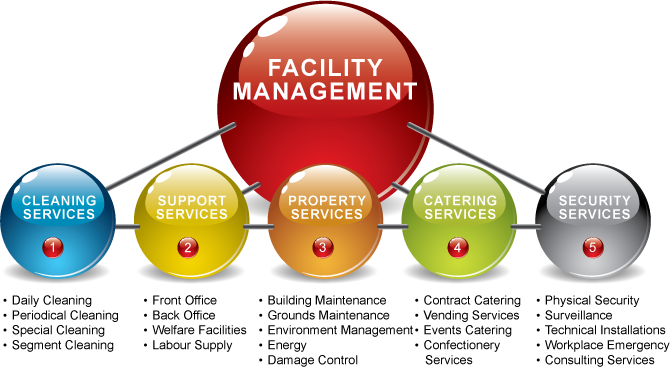Facility Management-- Crucial Services for Efficient Procedures
Facility Management-- Crucial Services for Efficient Procedures
Blog Article
Secret Trends Forming the Future of Facility Administration in 2024
As we look in advance to 2024, the landscape of facility management is poised for substantial transformation, driven by numerous key fads. The assimilation of wise building modern technologies and a change towards data-driven decision-making pledge to boost operational performance while prioritizing sustainability in method. The emergence of crossbreed job versions is improving office atmospheres, necessitating ingenious design options that provide to progressing employee requirements. In the middle of these adjustments, the focus on occupant health remains to gain grip, emphasizing the value of a healthy and balanced office. Exactly how these trends will certainly manifest in practice remains a crucial inquiry for industry professionals.
Smart Structure Technologies

Smart structure innovations include a wide selection of systems, consisting of intelligent lights, a/c controls, and protection systems. By incorporating these systems, facility managers can check and readjust parameters in real-time, leading to substantial decreases in power waste and functional costs. For example, smart sensors can discover tenancy degrees and change lights and temperature accordingly, making certain that power is only made use of when necessary.
Furthermore, these innovations assist in boosted information collection, permitting organizations to track usage patterns and identify possibilities for more enhancements. The execution of smart structure innovations not just adds to sustainability objectives but likewise develops much healthier workplace that can boost employee productivity and satisfaction.
As we move right into 2024, the adoption of wise structure technologies will likely accelerate, reflecting a broader shift towards more smart, responsive, and lasting facility administration practices.
Data-Driven Decision Making
Increasingly, organizations are leveraging data-driven choice making to improve facility administration practices. By using data analytics, center supervisors can derive workable understandings that dramatically improve functional effectiveness and resource allocation. The integration of advanced innovations, such as IoT sensing units and real-time surveillance systems, allows the collection of substantial amounts of information on structure performance, occupancy rates, and power intake.
This riches of details allows facility supervisors to determine fads, forecast maintenance needs, and proactively address problems prior to they intensify. Predictive analytics can forecast equipment failings, minimizing downtime and repair service prices. In addition, information visualization tools promote far better interaction among stakeholders, ensuring that educated choices are made collaboratively.
Furthermore, data-driven approaches boost tactical planning by making it possible for facility managers to assess the efficiency of present practices and make notified selections regarding investments in modern technology or framework. As companies progressively prioritize operational quality, data-driven choice production is poised to end up being a foundation of successful center management techniques in 2024 and beyond. Ultimately, the capacity to leverage data effectively will empower companies to produce a lot more effective, efficient, and durable centers.
Sustainability and Environment-friendly Practices
The emphasis on data-driven decision making normally lines up with the expanding concentrate on sustainability and eco-friendly techniques within facility management. As companies increasingly focus on environmental responsibility, facility supervisors are leveraging analytics to maximize resource usage, reduce waste, and lessen carbon footprints. This strategic strategy allows the assimilation of energy-efficient systems, such as LED lighting, wise HVAC controls, and renewable resource resources right into center procedures.
Furthermore, the application of sustainable methods prolongs beyond power intake. Center managers are promoting and taking on green products reusing efforts to create a round economy within their facilities. This not just boosts the environmental account of the company but additionally cultivates a culture of sustainability amongst employees.
Compliance with environmental policies is one more crucial element driving the fostering of green techniques. By using data analytics, facility managers can keep track of index compliance metrics and determine locations for renovation, guaranteeing adherence to regional and international sustainability criteria.
Hybrid Work Versions
A substantial shift in the direction of crossbreed work designs is improving the landscape of center administration in 2024. This paradigm combines in-office and remote job, demanding a reevaluation of area use, resource allotment, and staff member interaction approaches. Organizations are significantly identifying the value of flexible workspaces that deal with varied requirements and preferences.
Facility managers should adjust by applying versatile office designs that sustain collective efforts while giving areas for concentrated job. This includes the integration of innovation to help with smooth communication and cooperation amongst in-office and remote employees. Smart building options, equipped with analytics and sensing units, permit for real-time surveillance of space use, allowing companies to optimize their settings successfully.
Moreover, find here crossbreed job models emphasize the demand for effective center management that prioritizes staff member experience. In significance, the hybrid work design is transforming facility monitoring, urging a positive strategy to fulfill the progressing demands of the workforce.
Enhanced Occupant Wellness
As companies welcome hybrid job models, an increased focus on passenger wellness is coming to be integral to center management strategies. Facility Management. This change acknowledges that a healthy and balanced and satisfied workforce directly influences performance and retention prices. Facility managers are now prioritizing settings that advertise psychological and physical wellness, incorporating components such as natural illumination, biophilic style, and obtainable wellness sources

Innovation plays an essential duty in this evolution. Smart building systems can check ecological elements and change setups in real-time, guaranteeing ideal comfort levels - Facility Management. Moreover, responses devices, such as occupancy sensing units and worker studies, enable facility supervisors to consistently fine-tune wellness efforts based upon occupant needs.

Conclusion
In 2024, the future of center management will be significantly affected by the combination of smart building technologies and data-driven decision-making, promoting enhanced functional effectiveness. Sustainability efforts will certainly focus on environmentally friendly practices, while the introduction of hybrid job models will necessitate adaptable workplace layouts. Moreover, a heightened concentrate on occupant wellness with innovative HVAC systems and biophilic design will certainly add to much healthier work environments. These fads jointly highlight the evolving landscape of center monitoring in response to contemporary challenges and opportunities.
Center supervisors are advertising and taking on green materials recycling campaigns to develop a round economy within their centers.A significant change in the direction of hybrid work designs is reshaping the landscape of facility monitoring in 2024.In addition, hybrid work versions emphasize the demand for reliable center monitoring that prioritizes employee experience.As companies accept hybrid job designs, an enhanced emphasis on owner wellness is ending up being essential to facility administration techniques.In 2024, the future of center management will be dramatically influenced by the assimilation of wise structure modern technologies and data-driven decision-making, fostering enhanced functional performance.
Report this page